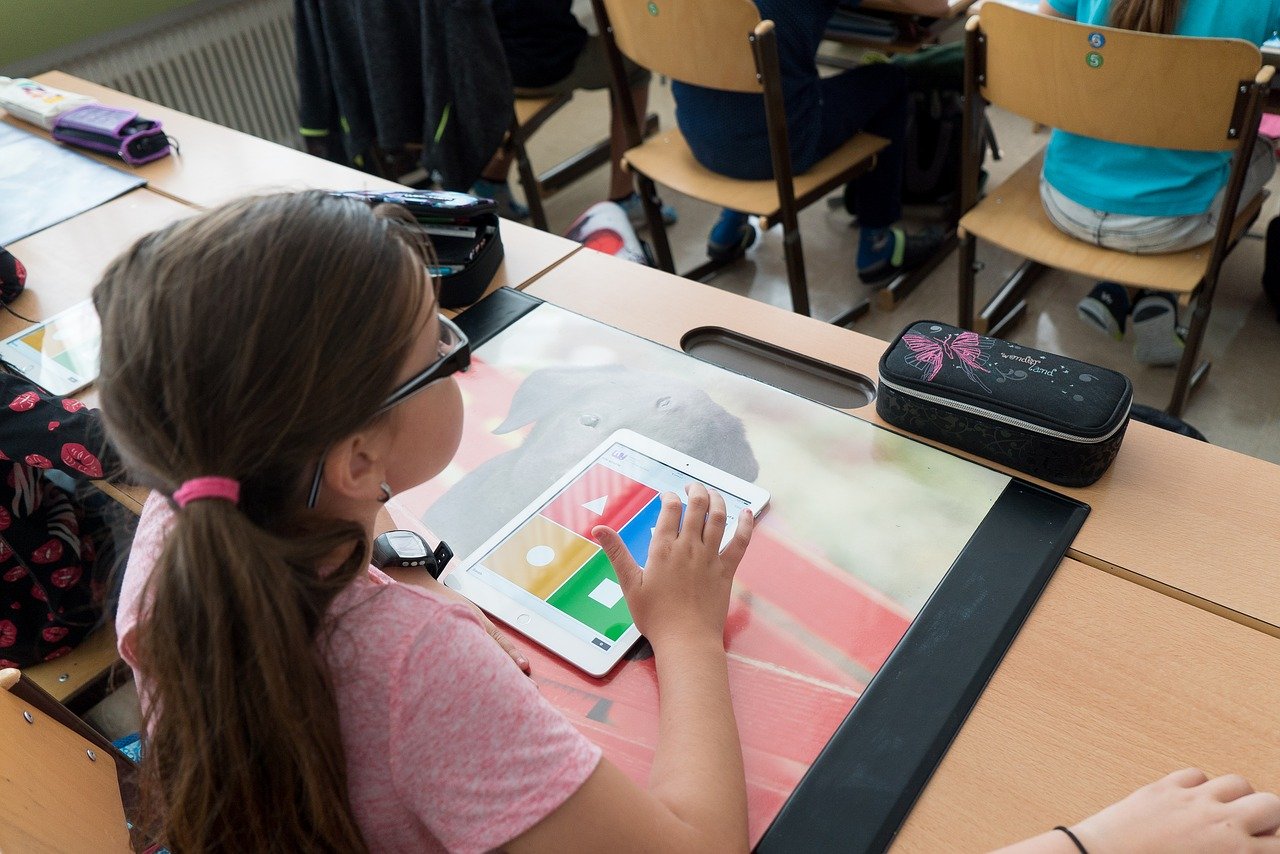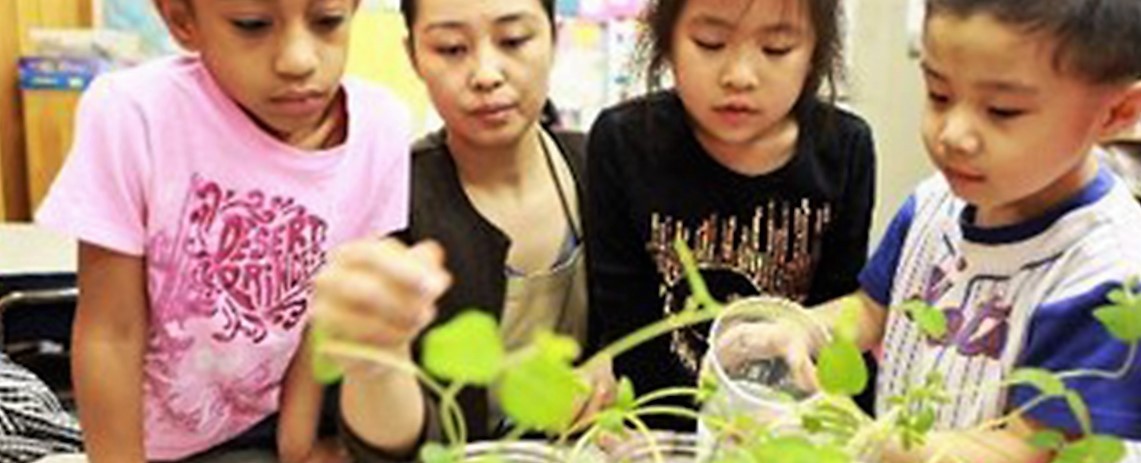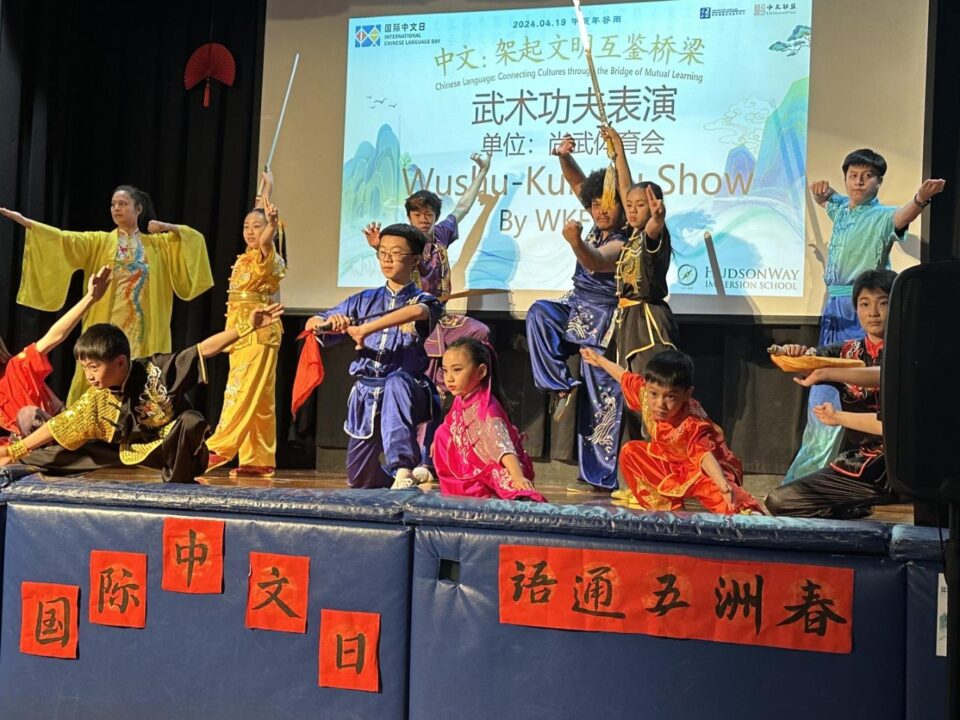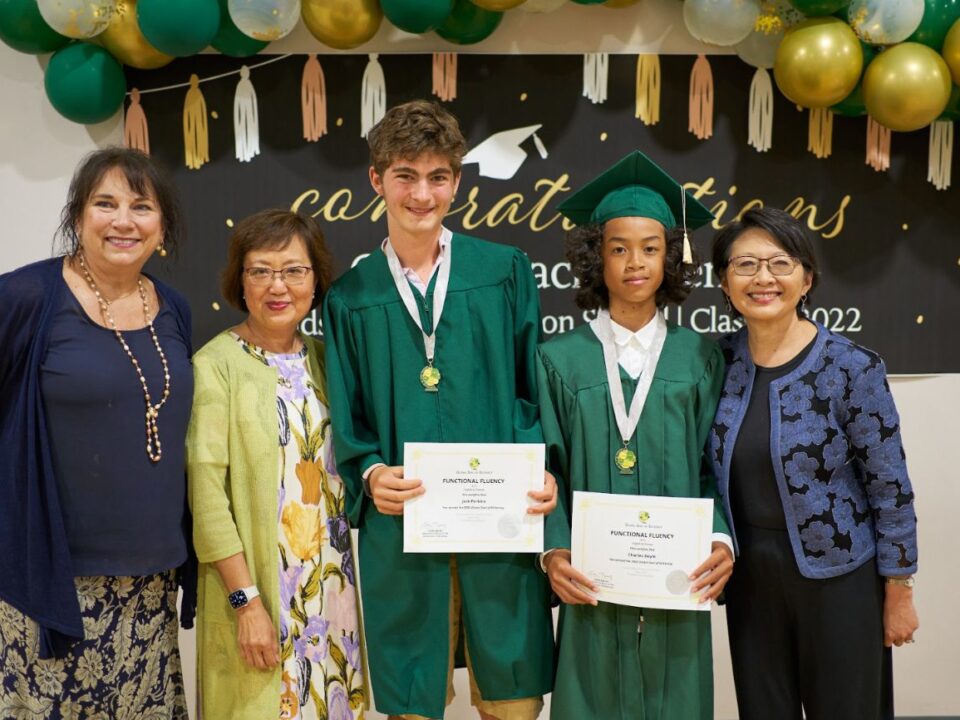
CNBC Segment on Mandarin Immersion by Mandy Drury—Jan 2011
January 1, 2011
Traveling With Young Children?
February 1, 2013By Sarah Golin/For the Star Ledger
Article credit: nj.com
Children are seated on a colorful rug while the teacher leads them in singing a nursery rhyme. It is a scene typical of any preschool in New Jersey, but this school has a difference — the children are singing in Mandarin Chinese.
The students at Bilingual Buds in Summit aren’t just celebrating one day of Chinese culture. Instead, they are learning Chinese in an “immersion” program, where most of the class is conducted in a foreign language.
Bilingual Buds, which also has a program in Spanish, is one of several immersion language preschools in the state, and experts say interest is growing in these programs, as the benefits of bilingualism become more fully understood and accepted.
Immersion, or dual-language, education is different than learning a language through an hour of weekly or even daily instruction. In these programs, all subjects, including math, language arts, pre-reading and reading skills, are taught in two languages, the target language and English. And for the most part, the target language dominates the instruction time.
“There is a growing popularity for both public and private schools to embrace immersion language education,” says Karen Nemeth, a consultant in bilingual education and a former education specialist for the New Jersey Department of Education in the office of preschool education.
She notes that immersion preschools have even been embraced by public school districts in New Jersey. Elizabeth, Hoboken and Englewood are among the districts that have offered dual-language programs in recent years, according to the Center for Applied Linguistics in Washington, D.C.
“The most unquestionable benefit of dual-language learning is the opportunity to expose a child to diversity and to be a global citizen. That goal is always accomplished in these kinds of programs,” she says.
Other research, she says, shows bilingual kids develop stronger “metalinguistic” skills, meaning they can acquire new languages and new vocabulary in all languages with greater ease. She notes that there is also evidence that it enhances creativity and problem solving skills, and even some evidence that being raised bilingual protects against Alzheimer’s in old age.
But, Nemeth notes, “this is only true of children who grow up fully bilingual, and you can’t claim that any school will lead to that result.”
The quality of the program and the support at home are other factors that influence the advantages of bilingual learning. “If the parents aren’t going to participate and support it, it is much less beneficial,” she says.
Parents of preschoolers enrolled in these programs, however, are some of their biggest proponents.
Laura Farmer enrolled her two children in the immersion Spanish program with Bilingual Buds last year. Cameron, 5, is in the kindergarten class this year, and Declan, 4, is in the preschool.
Farmer had her children in a weekly Spanish class and she was trying to reinforce that with teaching at home, when she discovered the school was opening a Spanish program.
“I am not a native speaker,” said Farmer, “but I love languages and I’m trying to give them the opportunity to learn as early as possible.”
She is trained as an opera singer, and her studies required training in four languages, including Spanish.
She calls the chance to put her children in an immersion program “a real gift,” and says her sons have progressed dramatically.
“I’m pretty thrilled with the way they have been picking up the language,” she says. “At this age, they are like little sponges and they are picking up so much.”
At the French Academy of Bilingual Culture, with locations in New Milford and Morris Plains, one-third of the families do not have a French speaker at home, but are just interested in the advantages of bilingualism. Currently, the school goes from preschool through second grade, and it will open a third grade next year, with a total enrollment of more than 100 children.
Anne-Sophie Gueguen, founder of the academy, says that “it is true that it might not fit all children, because it is hard work” to learn in an immersion program but notes that the commitment of the parents and the child is the key to success. She says it is important that “parents become part of the adventure.”
When children enter the program without knowing French, Gueguen says, they enter a “silent period,” of a few weeks, or more typically, a few months, where they’re absorbing the new language. They then start to say a few words and repeat common phrases. Speaking in full sentences comes later.
For Sonya Park, who enrolled her two daughters in the French Academy in September, the transition to French came more quickly than she expected.
Park speaks Russian, and her husband speaks Korean. “We were so lazy with teaching them our own languages, that I wanted them to be in an immersion (program) to really learn,” she says. She has one daughter in pre-kindergarten and another in kindergarten, and she plans to enroll her 2-year-old son in the preschool this fall.
Park and her husband bought the Rosetta Stone language program for themselves and began practicing French last summer so they could help their girls with homework. “But within a couple of months, the girls were moving so much faster than we were. By the fall, there was no way we could catch up with them,” says Park.
One surprising benefit has been that the girls have shown more interest in learning other languages, including Korean, which their father and grandparents speak, Park says.
“We strongly believe bilingual education can open your mind and become a better global citizen,” she says. “I think it makes you smarter; it opens up more of your brain.”
Bauhui Wang enrolled her daughter, Abigail, in the Chinese preschool at Bilingual Buds precisely because she wanted to maintain the language and culture of her country of origin. She also plans to enroll her son, who is now 8 months old, in the school when he is 2½. She and her husband came from China to the United States in the 1990s, but they still have many relatives who live in China.
“It’s very important to us for our children to know Chinese culture,” she says. The celebration of holidays and other aspects of culture mean as much to her as the language, she says, because as a parent who works full time she doesn’t always have the energy to put into preserving the cultural traditions at home.
But Wang is the exception at this school. In the Bilingual Buds’ Chinese program, nearly 70 percent of the families do not speak the language at home, notes Sharon Huang, director of the school. In the Spanish track, she says, it is more like 50 percent.
Huang says most of these parents “are looking to give their children an edge in this global world. They understand that language acquisition is easier when you’re young, and you can become more culturally aware. They are seeing that as a skill, that it’s important.”
Article credit: nj.com
Children are seated on a colorful rug while the teacher leads them in singing a nursery rhyme. It is a scene typical of any preschool in New Jersey, but this school has a difference — the children are singing in Mandarin Chinese.
The students at Bilingual Buds in Summit aren’t just celebrating one day of Chinese culture. Instead, they are learning Chinese in an “immersion” program, where most of the class is conducted in a foreign language.
Bilingual Buds, which also has a program in Spanish, is one of several immersion language preschools in the state, and experts say interest is growing in these programs, as the benefits of bilingualism become more fully understood and accepted.
Immersion, or dual-language, education is different than learning a language through an hour of weekly or even daily instruction. In these programs, all subjects, including math, language arts, pre-reading and reading skills, are taught in two languages, the target language and English. And for the most part, the target language dominates the instruction time.
“There is a growing popularity for both public and private schools to embrace immersion language education,” says Karen Nemeth, a consultant in bilingual education and a former education specialist for the New Jersey Department of Education in the office of preschool education.
She notes that immersion preschools have even been embraced by public school districts in New Jersey. Elizabeth, Hoboken and Englewood are among the districts that have offered dual-language programs in recent years, according to the Center for Applied Linguistics in Washington, D.C.
“The most unquestionable benefit of dual-language learning is the opportunity to expose a child to diversity and to be a global citizen. That goal is always accomplished in these kinds of programs,” she says.
Other research, she says, shows bilingual kids develop stronger “metalinguistic” skills, meaning they can acquire new languages and new vocabulary in all languages with greater ease. She notes that there is also evidence that it enhances creativity and problem solving skills, and even some evidence that being raised bilingual protects against Alzheimer’s in old age.
But, Nemeth notes, “this is only true of children who grow up fully bilingual, and you can’t claim that any school will lead to that result.”
The quality of the program and the support at home are other factors that influence the advantages of bilingual learning. “If the parents aren’t going to participate and support it, it is much less beneficial,” she says.
Parents of preschoolers enrolled in these programs, however, are some of their biggest proponents.
Laura Farmer enrolled her two children in the immersion Spanish program with Bilingual Buds last year. Cameron, 5, is in the kindergarten class this year, and Declan, 4, is in the preschool.
Farmer had her children in a weekly Spanish class and she was trying to reinforce that with teaching at home, when she discovered the school was opening a Spanish program.
“I am not a native speaker,” said Farmer, “but I love languages and I’m trying to give them the opportunity to learn as early as possible.”
She is trained as an opera singer, and her studies required training in four languages, including Spanish.
She calls the chance to put her children in an immersion program “a real gift,” and says her sons have progressed dramatically.
“I’m pretty thrilled with the way they have been picking up the language,” she says. “At this age, they are like little sponges and they are picking up so much.”
At the French Academy of Bilingual Culture, with locations in New Milford and Morris Plains, one-third of the families do not have a French speaker at home, but are just interested in the advantages of bilingualism. Currently, the school goes from preschool through second grade, and it will open a third grade next year, with a total enrollment of more than 100 children.
Anne-Sophie Gueguen, founder of the academy, says that “it is true that it might not fit all children, because it is hard work” to learn in an immersion program but notes that the commitment of the parents and the child is the key to success. She says it is important that “parents become part of the adventure.”
When children enter the program without knowing French, Gueguen says, they enter a “silent period,” of a few weeks, or more typically, a few months, where they’re absorbing the new language. They then start to say a few words and repeat common phrases. Speaking in full sentences comes later.
For Sonya Park, who enrolled her two daughters in the French Academy in September, the transition to French came more quickly than she expected.
Park speaks Russian, and her husband speaks Korean. “We were so lazy with teaching them our own languages, that I wanted them to be in an immersion (program) to really learn,” she says. She has one daughter in pre-kindergarten and another in kindergarten, and she plans to enroll her 2-year-old son in the preschool this fall.
Park and her husband bought the Rosetta Stone language program for themselves and began practicing French last summer so they could help their girls with homework. “But within a couple of months, the girls were moving so much faster than we were. By the fall, there was no way we could catch up with them,” says Park.
One surprising benefit has been that the girls have shown more interest in learning other languages, including Korean, which their father and grandparents speak, Park says.
“We strongly believe bilingual education can open your mind and become a better global citizen,” she says. “I think it makes you smarter; it opens up more of your brain.”
Bauhui Wang enrolled her daughter, Abigail, in the Chinese preschool at Bilingual Buds precisely because she wanted to maintain the language and culture of her country of origin. She also plans to enroll her son, who is now 8 months old, in the school when he is 2½. She and her husband came from China to the United States in the 1990s, but they still have many relatives who live in China.
“It’s very important to us for our children to know Chinese culture,” she says. The celebration of holidays and other aspects of culture mean as much to her as the language, she says, because as a parent who works full time she doesn’t always have the energy to put into preserving the cultural traditions at home.
But Wang is the exception at this school. In the Bilingual Buds’ Chinese program, nearly 70 percent of the families do not speak the language at home, notes Sharon Huang, director of the school. In the Spanish track, she says, it is more like 50 percent.
Huang says most of these parents “are looking to give their children an edge in this global world. They understand that language acquisition is easier when you’re young, and you can become more culturally aware. They are seeing that as a skill, that it’s important.”





